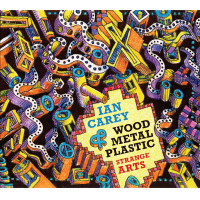Home » Jazz Articles » Multiple Reviews » Clean Feed 2018
Clean Feed 2018
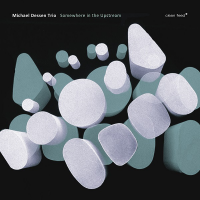 Michael Dessen Trio
Michael Dessen Trio Somewhere In The Upstream
Dedicated to the master Yusef Lateef, trombonist Michael Dessen's fourth release on clean feed (plus two additional discs with Mark Dresser) continues his work both acoustically and by augmentation with electronics. His conception is one of a long form score, what he calls a "scorestream," which allows his partners to interpret and improvise upon. With partners, bassist Chris Tordini and drummer Dan Weiss, who are celebrated musicians and improvisers in their own right, there is effortlessness in executing Dessen's concepts.
The music is comprised of one 50-minute take, divided into eight parts. Classifying it as either composed or improvised, jazz or chamber music, acoustic or software processed is a dicey proposition. Dessen has prepared a score which the musicians can view in realtime, but it is not static and of course the musician's interpretations are also fluid. What the trio forfeits, from a purely free improvisational aspect is made up for in the fluidity and zones which the structure (if we can use that word here) allows. The music has a coherence or flow to it, not unlike a championship basketball team executing on the court.
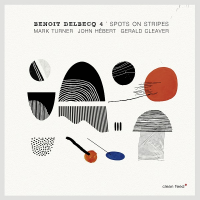 Benoît Delbecq 4
Benoît Delbecq 4 Spots On Stripes
Benoît Delbecq must know the formula for a successful jazz improvising ensemble. I say that because he always attracts high caliber partners to his projects, like his sessions with Fred Hersch, Gerry Hemingway, Tony Malaby, Arve Henriksen, Francois Houle, and Evan Parker, to name just a few. Here we find him with bassist John Hébert and drummer Gerald Cleaver, who form the John Hébert Trio. The trio released two stellar recordings, Floodstage (Clean Feed, 2014) and Spiritual Lover (Clean Feed, 2010). With Spots On Stripes, there is the addition of tenor saxophonist Mark Turner, plus all the compositions here are by Delbecq.
Delbecq maintains an air of detachment in this music. Not so much in an unapproachable manner, but he treats his compositions as an exaltation. Even with a prepared piano piece like "Broken World." he maintains a peaceful veneration in the music. The rickety pulse of trains rattle "The Loop Of Chicago" freeing Cleaver to clatter until the rails calm with Turner's almost metal-on-metal intimation. Delbecq celebrates the piano both as a chordal instrument, but maybe more importantly as a percussive device.
 Susana Santos Silva
Susana Santos Silva All The Rivers
Listed as a solo performance. All The Rivers -Live At Panteão Nacional by Susana Santos Silva is more like a duet, one between a trumpet and a building. In this case the National Pantheon / Santa Engrácia's Church in Lisbon, Portugal. Santos Silva has gained a reputation as a skilled improviser and soloist, recording with Jonas Kullhammar, Mats Gustafsson, Kurt Rosenwinkel, and Adam Lane, plus leading multiple groups including Lama with Gonçalo Almeida and Greg Smith.
This solo performance, part of Rescaldo Festival on February 12th, 2016, utilizes the resonant acoustics of the church with its substantial time lag to create the modern equivalent of chanting. Santos Silva points the bell of her horn in differing directions for differing and contrasting effects. Certainly the experimentalist trumpeters Peter Evans and Nate Wooley come to mind here. The quieted listeners are treated to the reverberations of Santos Silva's trumpet, tin whistle and bells, all measured out with patience. Any attempt to accelerate the pace of notes would create a resounding noise. She parses out notes with a gentle beauty.
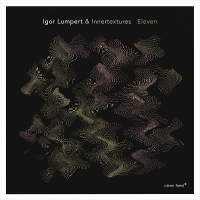 Igor Lumpert & Innertextures
Igor Lumpert & Innertextures Eleven
Winning the last three World Road Race championships, Peter Sagan is arguably the best cyclist in the world. Why do I tell you this? Because like Sagan, Igor Lumpert is Slovenian. As once we never associated Slovenia with bicycle racing, we never thought one of their sons might become a world beating saxophonist. With his band Innertextures, Lumpert releases his second recording for Clean Feed. Eleven follows his trio recording Innertextures Live (2012).
Maybe it is the addition of alto saxophonist Greg Ward to make the trio a quartet or maybe it's just the attitude of the sounds, but the music is easily mistaken for the sounds of contemporary Chicago jazz. Lumpert performs with the same candid approach as Keefe Jackson, Edward Wilkerson Jr., or, say Ernest "Khabeer" Dawkins. As a composer, he leans on the traditions of jazz, but cuts them with Slovenian folk and a contemporary rawboned sharpness. Guest on two tracks, trumpeter Jonathan Finlayson and on one track is bass clarinetist John Ellis. Lumpert proves an adept arranger of intricate music.
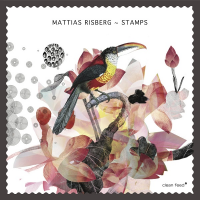 Mattias Risberg
Mattias Risberg Stamps
The discovery of an iconoclast in music is actually a rare event. Sure we have legions of free music performers and self-styled renegades, but those that toil in the realm of pure imagination are as scarce as hen's teeth. Pianist Mattias Risberg is one such nonconformist.
With Stamps, he dispatches eleven spontaneous performances recorded in his home on a prepared grand piano with Moog Taurus pedals. Risberg is a vintage instrument aficionado with a passion for old analog synthesizers, mellotrons, clavichords and pipe organs. His music might be compared to that of Cooper-Moore. Both men share the ability to make music from seemingly found objects and nearly discarded instruments. Here, Risberg ranges from slightly off-kilter love songs "Scarlet" to percussive assaults "Phtalo." He can extract a melody from the piano "Crimson," that comes across as a futuristic music box from film Blade Runner. Maybe a more appropriate title for these pieces might be Ugly Beauty.
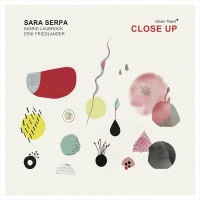 Sara Serpa
Sara Serpa Close Up
The mostly wordless vocal album Up Close by Portuguese vocalist Sara Serpa speaks volumes. Her trio with saxophonist Ingrid Laubrock and cellist Erik Friedlander delivers a chamber-like performance, if by chamber music you mean Downtown campfire music. Serpa now a member of the New York creative scene has ongoing collaborations with Ran Blake, John Zorn, Mark Turner, and Zeena Parkins, besides her long-standing duo with guitarist André Matos.
This trio, like a three legged stool, maintains it's unity and consistency with each player bearing equal weight. Without the benefit of harmonic or rhythmic instrumental support, they lean into each other for reinforcement. Serpa's song eschews scatting for pure notes. "Storm Coming" opens with Laubrock's extended (and whispered) saxophone technique that segues into Serpa singing what only can be described as one note, like wheels or circles of various chakras. Part lyric poetry and part tone poems, these pieces reveal varying textures. When she sings words, they are in Portuguese "Pássaros" and English "Woman" and "The Future." Interestingly enough, Serpa expresses equally wordless, and with words. This is one beautiful effort.
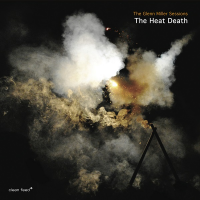 The Heat Death
The Heat Death The Glenn Miller Sessions
Not for the weak of heart. These 3¼ hours of music spread out over three discs are definitely not for the the feeble or pusillanimous. Note: listening to this quintet necessitates the use of a thesaurus, thus we get words like 'pusillanimous' and 'honorificabilitudinitatibus.' And honorificabilitudinitatibus does indeed characterize The Heat Death. Their music does possess an honorableness of purpose.
The quintet is made up of saxophonist/clarinetist Kjetil Møster (Crimetime Orchestra, Trinity, Zanussi Five, Møster!), saxophonist/flutist Martin Kuchen (Angles, Trespass Trio, Martin Küchen Trio), trombonist Mats Äleklint Quartet (Paal Nilssen-Love Large Unit, Angles, Fire! Orchestra), bassist Ola Høyer (Cortex), and drummer Dag Erik Knedal Andersen (kÖök, Saka, Burning Tree). They draw from the avant garde, bebop, harsh noise, free jazz, African music, and the Scandinavian large ensemble tradition. They scorch the bandstand with both a volume and intensity that could make Peter Brötzmann shed a tear, but they also perform gentle love songs to butterflies. That is, of course butterflies with crash helmets. The music has an endurance component with the shortest track at 11-minutes and the longest is 29. Listeners pace yourselves, it certainly is worth the effort.
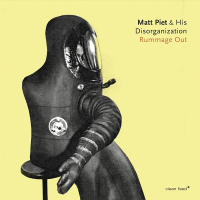 Matt Piet & His Disorganization
Matt Piet & His Disorganization Rummage Out
Sometimes recordings prompt you to stick a pin in your mental database of musicians. With the live recording Rummage Out you might want to make a note to catch pianist Matt Piet next time he (or you) are in town. He has caught the attention of local listeners since returning to Chicago after his education at Berklee College of Music in Boston. His sound is rooted in the 1960's music of Cecil Taylor and blossoms much like pianists Irene Schweizer and Fred Van Hove.
Piet maintains a working piano/bass/drums trio, a piano/saxophone/drums trio Four Letter Words, and has made several recordings with Chicago veterans Dave Rempis and Tim Daisy, the latest being Throw Tomatoes (Astral Spirits, 2018). This recording from 2017 evidences a his full absorption into the Chicago improvising scene. The assembled quartet of Piet, cornetist Josh Berman, alto saxophonist Nick Mazzarella, and drummer Tim Daisy meld seamlessly, by that I mean without a title, this outing could had attributed its leadership to any member of the quartet.
The two lengthy improvised pieces retain a coherence throughout, much like a recording by the late Misha Mengelberg's quartets. In fact, this sound very much is rooted in the New Dutch Swing. Piet has the ability to expand his keyboard sound to accommodate the high voltage of Mazzarella or retreat into the intimacy of Berman's cornet or Daisy's percussive explorations. This is exhilarating music.
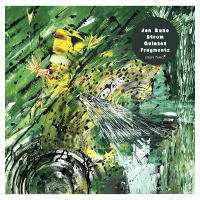 Jon Rune Strøm Quintet
Jon Rune Strøm Quintet Fragments
To quote Chuck D of Public Enemy, "Bass. How low can you go?" Certainly, Jon Rune Strøm answers that question on Fragments. Opening with a traditional Norwegian folk melody "Bansull etter moren," Strøm and second bassist Christian Meaas Svendsen deliver a 6½ minute presentation of their low end theory. First it's arco bow chasing arco bow before morphing into some rumbling pulled strings clearing the quintet for takeoff. Strøm takes conventional folk music, plus his remaining compositions on a post-modern ride.
Strøm, whose resume includes Frode Gjerstad Trio, Universal Indians, Saka, and Friends & Neighbors, enlists trumpeter Thomas Johansson (Cortex), drummer Andreas Wildhagen, and Svendsen all fellow members of Paal Nilssen-Love Large Unit, plus saxophonist André Roligheten (Gard Nilssen's Acoustic Unity) to execute these six pieces. "Main Source/365-B" relies on equal measures of post-bop mayhem and silence an accelerant. The guttural roar of the title piece with it's Hendrix-like electric bass feedback pairs with the massive attack of Roligheten. Next, Johansson's trumpet is featured on the slow grooves of "Blood." Strøm favors a mid-sixties Blue Note swing on "Wallack," filtered through a mischievous gauze of reduction and of course plenty of low end explorations.
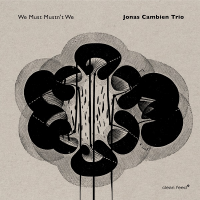 Jonas Cambien Trio
Jonas Cambien Trio We Must Mustn't We
Half the fun is learning the new musical language a pianist like Jonas Cambien is speaking. We Must Mustn't We is the second release by his trio, and follows A Zoology Of The Future (Clean Feed, 2016). The pianist, a Belgian-born, now resident of Oslo has one foot in contemporary music and a second in free jazz. His compositions, and more importantly the expression by his trio, with saxophonist André Roligheten and drummer Andreas Wildhagen(both of Jon Rune Strøm's Quintet), articulates Cambien's freaky idiosyncratic language.
Freaky in that this new dialect is strange, yet somehow beautiful. Extended technique abounds. The percussive touch of "Creationism" and "Swear Like A Bear" cues halting off-kilter sounds from Roligheten and Wildhagen. The music is earnest, if that is a term that can be applied to this intersection of contemporary piano and angular jazz. When Cambien strips the music down on "Animalism," it becomes a child's music box and the most gentle sounds heard on "Long Long" create a haunting melody that persists after the 2½ minutes of the track have passed. That said, it is the weirdness and the wonder of these inventive pieces that are the ticket here.
Tracks and Personnel
Somewhere In The Upstream
Tracks: Part 1; Part 2; Part 3; Part 4; Part 5; Part 6; Part 7; Part 8.
Personnel: Michael Dessen: trombone, computer; Christopher Tordini: bass; Dan Weiss: drums. .
Spots On Stripes
Tracks: Spots On Stripes; Broken World; Rosemary K; The Loop Of Chicago; Disparition du Si; Dawn Sounds; Old Vinyl; Springs; Dripping Stones; De Staël.
Personnel: Mark Turner: tenor saxophone; Benoît Delbecq: piano; John Hébert: double bass; Gerald Cleaver: drums.
All The Rivers
Tracks: All The Rivers.
Personnel: Susana Santos Silva: trumpet, tin whistle, bells.
Eleven
Tracks: 13th of August; XmD; poseidon; Paha; Eleven; Brela.
Personnel: Igor Lumpert: tenor saxophone; Greg Ward: alto saxophone; Chris Tordini: double bass; Jonathan Finlayson: trumpet; John Ellis: bass clarinet; Kenny Grohowski: drums.
Stamps
Tracks: Vermilion; Cobalt; Emerald; Marine; Scarlet; Sienna; Viridian; Phthalo; Crimson; Titanium; Umber.
Personnel: Mattias Risberg: piano, Moog Taurus.
Close Up
Tracks: Object; Pássaros; Sol Enganador; The Future; Listening; Storm Coming; Woman; Quiet Riot; Cantar Ao Fim.
Personnel: Sara Serpa: voice, composition; Ingrid Laubrock: tenor saxophone, soprano saxophone: Erik Friedlander: cello.
The Glenn Miller Sessions
Tracks: (CD1) Myriads Of Space 1; Myriads Of Space 2, See Don'tTell; (CD2) Myriads Of Space 3; Hear Don't Say; Unservable Jazz Soup; (CD#) Towards The Uncool; A Clandestine Jazz Operation; Myriads Of Space 4.
Personnel: Kjetil Møster: tenor saxophone, clarinet: Martin Küchen alto saxophone, flute; Mats Aleklint: trombone; Ola Høyer: double bass; Dag Erik Knedal Andersen: drums.
Rummage Out
Tracks: Lost & Found; The Last Place You Look.
Personnel: Matt Piet: piano; Josh Berman: cornet; Nick Mazzarella: alto saxophone; Tim Daisy: drums, percussion.
Fragments
Tracks: Bånsull Etter Moren; Main Source/365-B; Fragments; Blood; Wallack; Stillhetens Hav.
Personnel: Thomas Johansson: trumpet; André Roligheten: tenor saxophone; Christian Meaas Svendsen: double bass, Fender bass; Jon Rune Strøm: double bass, Fender bass; Andreas Wildhagen: drums.
We Must Mustn't We
Tracks: Creationism; Swear Like A Bear; Long Long; Survivalism; Crib; Renaissance; Animalism; Copper Man; I Must Mustn't I; Unlikely Friendship; Sister, you Proved Me Right; Long Long Long.
Personnel: André Roligheten: soprano saxophone, tenor saxophone, bass clarinet, flute; Andreas Wildhagen: drums, percussion, trumpet; Jonas Cambien: piano, microtonal melodica; Torstein Lavik Larsen: trumpet.
< Previous
Seven Women 2018 – Part V
Next >
Vortex
Comments
Tags
Multiple Reviews
Mark Corroto
Portugal
Lisbon
Peter Brotzmann
Joe McPhee
Ivo Perelman
Elliott Sharp
anthony braxton
Rudresh Mahanthappa
Rodrigo Amado
Luis Lopes
Yusef Lateef
Michael Dessen
Mark Dresser
Dan Weiss
TONY MALABY
Arve Henriksen
Francois Houle
evan parker
John Hebert
Gerald Clever
Mark Turner
Susana Santos Silva
Jonas Kullhammar
Mats Gustafsson
Kurt Rosenwinkle
Adam Lane
Peter Evans
nate wooley
Greg Ward
Keefe Jackson
Jonathan Finlayson
John Ellis
Cooper-Moore
Sara Serpa
Ingrid Laubrock
erik friedlander
Ran Blake
john zorn
Zeena Parkins
Kjetil Møster
Martin Kuchen
Mats Äleklint
Matt Piet
Cecil Taylor
Irene Schweizer
Fred Van Hove
Dave Rempis
Tim Daisy
Throw Tomatoes
Josh Berman
Nick Mazzarella
Misha Mengelberg
Jon Rune Strøm
frode gjerstad
Thomas Johansson
Paal Nilssen-Love
Concerts
For the Love of Jazz
 All About Jazz has been a pillar of jazz since 1995, championing it as an art form and, more importantly, supporting the musicians who create it. Our enduring commitment has made "AAJ" one of the most culturally important websites of its kind, read by hundreds of thousands of fans, musicians and industry figures every month.
All About Jazz has been a pillar of jazz since 1995, championing it as an art form and, more importantly, supporting the musicians who create it. Our enduring commitment has made "AAJ" one of the most culturally important websites of its kind, read by hundreds of thousands of fans, musicians and industry figures every month.








